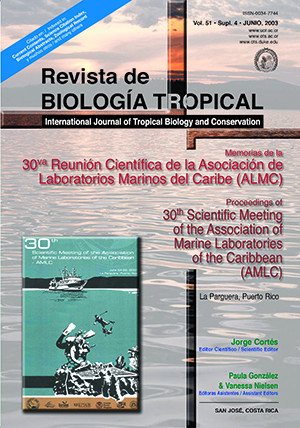Abstract
We evaluated RNA/DNA ratio as an index of physiological condition during larval development of a hybrid between the fishes Colossoma macropomum (cachama) and Piaractus brachypomus (morocoto). The samples were obtained by induced reproductive technology and the eggs were maintained in acrylic conical incubator with a continuous waterflow. Embryonic development, from egg fertilization to cell division and hatch out, took 12 hours 20 minutes at 29.5ºC, dissolved oxygen contents of 6.0 ppm and pH 7.5. Nucleic acids quantification was determined by fluorometry with ethidium bromide and Hoechst 33258 dyes. We observed significant changes of RNA/DNA ratios during all stages of the embryonic larval development. Therefore, RNA/DNA relation is an useful technique to evaluate physiological condition in short period and could be utilized as nutritional condition and/or instantaneous growth for routine check to verify the health status in early life of cultivated species.References
Blaxter, J. 1969. Development, eggs and larvae, p. 177-252. In W.S. Hoar & D.J. Randall (eds.). Fish Physiology, Vol III, Nueva York.
Bracho, M.A., M.I. Segnini de B., I. Viñoles & K.S. Chung. 2000. Efecto de la alimentación sobre la condición fisiológica del mejillón verde Perna viridis (L. 1758) (Mollusca: Mytilidae), medido por la relación ARN/ ADN. Rev. Biol. Trop. 48. Supl. 1: 171-182.
Buckley, L. 1984. RNA-DNA ratio: an index of larval fish growth in the sea. Mar. Biol. 80: 291-298.
Buckley, L., S. Turner, T. Halavik, A. Smigielski, S. Drew & G. Laurence. 1984. Effects of temperature and food availability on growth, survival, and RNA/DNA ratio of larval sand lance (Ammodytes americanus). Mar. Ecol. Prog. Ser. 15: 91-97.
Bulow, F. 1987. RNA-ADN ratios as indicators of growth in fish: A review, p. 45-64 In R.C. Summerfelt & G.E. Hall (eds.). The Age and Growth of Fish. Iowa State University, Iowa.
Canino, M. 1994. Effects of temperature and food availability on walleye pollock, Theragra chalcogramma (Pallas) eggs and larvae. J. Exp. Mar. Biol. Ecol. 175: 1-16.
Canino, M. & E. Calderone. 1995. Modification and com-parison of two fluometric techniques for determining nucleic and contents of fish larvae. Fish. Bull. 93: 158-165.
Chung, K., G. Holt & C. Arnold. 1993. Influence of salinity and food deprivation on growth and RNA-DNA ratio in red drum Sciaenops ocellatus (Pisces: Sciaenidae). Rev. Biol. Trop. 41: 187-195.
Clemmensen, C. 1987. Laboratory studies on RNA/DNA ratios of starved and fed herring (Clupea harengus) and turbot (Scophthalmus maximus) larvae. J. Cons. Int. Explor. Mer. 43: 122-128.
Clemmensen, C. 1988. A RNA and DNA fluorescence tech-nique to evaluate the nutritional condition of individ-ual marine fish larvae. Meeresforsch. 32: 134-143.
Contreras, P. & J. Contreras. 1993. Reproducción induci-da de peces tropicales, p. 125-138. In H. Rodríguez, G. Polo & G. Salazar (eds.). Fundamentos de Acuicultura Continental. Ministerio de Agricultura – Instituto Nacional de Pesca y Acuicultura, INPA, Santafé de Bogotá, Colombia.
Díaz, G., F. & R. López. 1993. El cultivo de la cachama blanca (Piaractus brachypomus) y de la cachama negra (Colossoma macropomum), p. 207-219. In H. Rodríguez, G. Polo & G, Salazar (eds.). Fundamentos de Acuicultura Continental. Ministerio de Agricultura – Instituto Nacional de Pesca y Acuicultura, INPA, Santafé de Bogotá, Colombia.
González, J. & B. Heredia, 1989. El cultivo de la cachama (Colossoma macropomum), Maracay, Venezuela. FONAIAP, Est. Exp. Guárico, Sub-Estación Guana-pito. 124 p.
Kossowski, C., N. Ottolina & J. Quero. 1983. Cariotipo del híbrido de “cachama” Colossoma macropomum (hembra) (Cuvier) 1818 x “Palometa” Mylossoma duriventris (macho) (Cuvier) 1818 y sus progenitores (Pises, Cypriniformes, Characidae). Acta Cient. Venezuela. 34: 173-175.
Lemus, M., K. Chung & G. Holt. 1993. Efecto de la temperatura sobre el crecimiento de juveniles de Petenia kraussii (Pisces: Cichlidae): Relación ARN-ADN. Rev. Biol. Trop. 41: 45-48.
Pérez, J. 1996. Mejoramiento genético en acuicultura. Coordinación de Publicaciones del Rectorado de la Universidad de Oriente, Cumaná, Estado Sucre, Venezuela. 178 p.
Raae, A., I. Opstad, P. Kvenseth & B. Walther. 1988. RNA, DNA and protein during early development in feeding and starved cod (Gadus morthua L.) larvae. Aquacul. 73: 247-259.
Richard, P., J. Bergerson, M. Boulhic, R. Galois & J. Leruyet. 1991. Effect of starvation on RNA-DNA and protein content of laboratory-reared larvae and juve-niles of Solea solea. Mar. Ecol. Prog. Ser. 72: 69-77.
Robinson, S. & D. Ware. 1988. Ontogenetic development of growth rates in larval Pacific herring, Clupea harengus pallasi, measured with RNA-DNA ratios in the Strait of Georgia, British Columbia. Can. J. Fish. Aquat. Sci. 45: 1422-1429.
Segnini de B., M. & K.S. Chung. 1997. Influencia de los factores ambientales sobre el crecimiento instantáneo de peces tropicales evaluados por el seguimiento de la relación ARN/ADN. Bol. Inst. Oceanogr. Venezuela 36: 21-29.
Segnini de B., M.I. & K.S. Chung. 2001. Ecophysioligcal behavior Caquetaia kraussii (Steinachner, 1878) (Pisces: Cichlidae) exposed to different temperatures and salinities. Rev. Biol. Trop. 49: 147-154.
Sokal, R. & J. Rohlf. 1997. Biometry. The Principles and Practice of Statistics in Biological Research. W. H. Freeman, Nueva York. 887 p.
Viñoles, I.V., M.I. Segnini de B., M.A. Bracho & K.S. Chung. 2000. Efecto de la temperatura de aclimatación sobre el crecimiento instantáneo del mejillón verde, Perna viridis (L. 1758) (Mollusca: Mytilidae), medido por la relación ARN/ADN. Rev. Biol. Trop. 48 (Supl. 1): 159-170.
Wright, D & F. Martín. 1985. The effect of starvation on RNA:DNA ratios and growth of larval striped bass Morone saxatalis. J. Fish Biol. 27: 479-485.
##plugins.facebook.comentarios##

This work is licensed under a Creative Commons Attribution 4.0 International License.
Copyright (c) 2003 Revista de Biología Tropical


